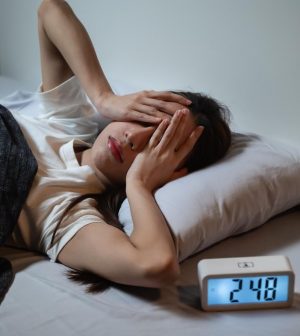- Could Your Grocery Store Meat Be Causing Recurring UTIs?
- Are You Making This Expensive Thermostat Error This Winter?
- Recognizing the Signs of Hypothyroidism
- 10 Strategies to Overcome Insomnia
- Could Artificial Sweeteners Be Aging the Brain Faster?
- Techniques for Soothing Your Nervous System
- Does the Water in Your House Smell Funny? Here’s Why
- Can a Daily Dose of Apple Cider Vinegar Actually Aid Weight Loss?
- 6 Health Beverages That Can Actually Spike Your Blood Sugar
- Treatment Options for Social Anxiety Disorder
Most Americans Struggle With Poor Sleep, Daytime Drowsiness: Survey

Nearly 8 in 10 Americans go through the day in a fog that interferes with their jobs, their moods and their relationships.
Chalk it up to sleepiness: A new survey shows that 54% of Americans think they just don’t get enough sleep.
“Daytime sleepiness is more than just an inconvenience — it can affect our ability to function our best, impacting everything from work productivity to personal relationships,” said sleep specialist Dr. Alexandre Abreu, a spokesman for the American Academy of Sleep Medicine (AASM), the survey sponsor.
The online poll of more than 2,000 adults was conducted in mid-May and revealed that daytime sleepiness is taking a big toll.
Nearly half (47%) of respondents said it hampers their productivity, making it hard to focus and complete work efficiently. One-third (31%) said sleepiness affects the quality of their work — a complaint more often voiced by men than by women.
A similar percentage (34%) of respondents see effects of sleepiness on their memory and mental recall, and 16% said it affects their reaction time behind the wheel.
Notably, nearly a quarter (24%) said it affects their relationships with family and friends.
“These statistics paint a clear picture of the widespread impact of daytime sleepiness,” Abreu said in an AASM news release.
The academy says adults need seven or more hours of sleep a night. It recommends maintaining a consistent bedtime, creating a restful environment for sleep and discussing sleep problems with a doctor.
“It’s crucial for individuals to recognize the importance of healthy sleep and seek help if they are struggling to sleep well on a regular basis,” Abreu said.
More information
The Mayo Clinic has a tips sheet that includes healthy habits for better sleep.
SOURCE: American Academy of Sleep Medicine, news release, Oct. 1, 2024
Source: HealthDay
Copyright © 2026 HealthDay. All rights reserved.










